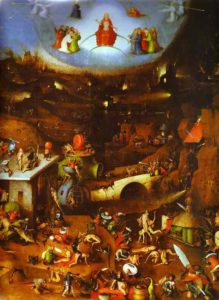by Gaedhal
Chomsky, when speaking of ‘body’, because he is a peerless genius—he is also a linguist and computer scientist—no doubt had in view Lucretius’s materialist poem: On the Nature of Things. What the Greeks called: atoma kai kena literally: uncuttable [monads] and emptiness(es) Lucretius rendered as: ‘Corpora et inane’, ‘bodies and the void’. What Chomsky seems to be saying is that there is no body, only void. Are not “massless particles” as Chomsky goes on to discuss a type of void?
I was reading Lucretius, earlier, and he assures his readers that not only does Hell, and its ridiculous torments not exist: it cannot exist.
‘It will now be reckoned, at this point in our [atheistic materialist] poem that not only does Cerebus, the Furies, the Plutonian infernal darkness, Tartarus vomiting from its throat fire and brimstone, etc. not exist… neither can it exist.’
A paraphrase and not a direct quote from Lucretius.
Lucretius rejoices, also, that Sisyphus is not tormented in Tartarus by having to roll a rock up a hill, and have it fall down again. Lucretius seems to anticipate Hitchens and antitheism by saying: not only is religion and its terrors not true, we are actually rather fortunate that religion and its preternatural terrors are not true. There was a missionary spirit in Epicureanism. They saw themselves as healers, abroad in the world to heal men’s minds from the mental torture caused by religion. They were in a sense like the New Atheists of their day.
Europe could have been spared the worst crime against humanity ever conceived, i.e. the Hell delusion, had Epicurus and Lucretius prevailed against Christ.

5 replies on “Hell”
What Lucretius actually wrote, in book 3 of his poem is:
Lucretius, De Rerum Natura III 1011–1013
I don’t think that my paraphrase was all that bad, actually.
Thank you for your clarifications, and also for what you clarify below this comment!
The racial right folk ignore that the doctrine of hell fried the brains of the Aryan, for example by inverting a fundamental value: from perceiving themselves as a people to perceiving themselves as atomised individuals who must, first and foremost, seek to save themselves from hell (which we see represented in the above painting by Hieronymus Bosch, with Christ at the top).
Just compare that nauseating surrealism with Greco-Roman art before Judaeo-Christian infection…
I was using Chomsky so as to critique the founding assertion of Marxism: i.e. that the world is wholly material. We have Marxists on the White Right: they style themselves: “National Bolsheviks”.
Here is page 239 from The Essential Chomsky (2008):
A more literal translation of the above would be:
It’s so long since I deconstructed christianity for my own mind I am only now reminded of the cheap and evil tricks it uses, tricks that advertisers and swindlers use.
Having to be baptised for original sin is so outrageous it should not need debunking, it’s easier to understand the alluring promise of eternal life in heaven by accepting christianity/jesus to avoid eternal torments of hell been a factor in people’s minds.
The etymology of the word “hell” from a positive indigenous European idea to a christian rebranding as negative is typical of the take over culture they employed.